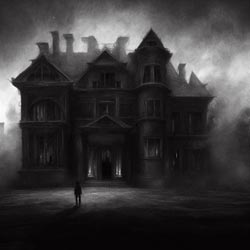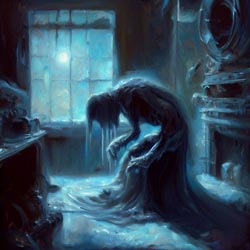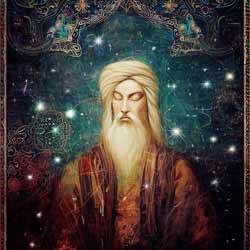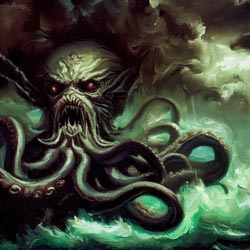 In the murky annals of Lovecraft's eerie creations, "The Shunned House" stands as a spectral monolith of haunting domestic decay. The tale, steeped in Lovecraft's signature penumbra, unfolds around a malignant abode; a sentient entity reverberating with tales of bygone horror and a lurking, monstrous presence suggestive of a hideous cosmic reality. This antiquated dwelling, awash in a pallor of repulsion and dread, becomes an obsessively dark fascination for the narrator, its malevolent aura leeching vitality from the hapless souls ensnared within its spectral grasp (Campbell, 1983).
In the murky annals of Lovecraft's eerie creations, "The Shunned House" stands as a spectral monolith of haunting domestic decay. The tale, steeped in Lovecraft's signature penumbra, unfolds around a malignant abode; a sentient entity reverberating with tales of bygone horror and a lurking, monstrous presence suggestive of a hideous cosmic reality. This antiquated dwelling, awash in a pallor of repulsion and dread, becomes an obsessively dark fascination for the narrator, its malevolent aura leeching vitality from the hapless souls ensnared within its spectral grasp (Campbell, 1983).
 In the gloom-fraught annals of Lovecraft's oeuvre, "Cool Air" occupies a peculiar, though no less chilling, niche. It unfurls not amid the cosmic cataclysms that make up the bulk of Lovecraft's work, but within the confines of an unassuming New York apartment, casting its paralyzing chill upon the mundane. Unlike his more famed grotesqueries, the horror in this tale, largely psychological, stems from the macabre circumstances surrounding an eccentric doctor, his peculiar cooling apparatus, and the tragic secret he harbours (Joshi, 1982).
In the gloom-fraught annals of Lovecraft's oeuvre, "Cool Air" occupies a peculiar, though no less chilling, niche. It unfurls not amid the cosmic cataclysms that make up the bulk of Lovecraft's work, but within the confines of an unassuming New York apartment, casting its paralyzing chill upon the mundane. Unlike his more famed grotesqueries, the horror in this tale, largely psychological, stems from the macabre circumstances surrounding an eccentric doctor, his peculiar cooling apparatus, and the tragic secret he harbours (Joshi, 1982).
 This comprehensive biography delves into the life and works of Jalāl ad-Dīn Muhammad Rūmī, known as Rumi, a 13th-century Persian poet, Islamic jurist, and theologian. From his early life and education in Balkh to his profound career as a scholar and teacher in Konya, the biography explores the influences that shaped Rumi's spiritual and intellectual journey. The biography is enriched with scholarly references and citations, providing a detailed and authentic account of Rumi's life and works.
This comprehensive biography delves into the life and works of Jalāl ad-Dīn Muhammad Rūmī, known as Rumi, a 13th-century Persian poet, Islamic jurist, and theologian. From his early life and education in Balkh to his profound career as a scholar and teacher in Konya, the biography explores the influences that shaped Rumi's spiritual and intellectual journey. The biography is enriched with scholarly references and citations, providing a detailed and authentic account of Rumi's life and works.
 In the disquieting gloam of Howard Phillips Lovecraft's "The Call of Cthulhu," we discern echoes of an undying influence that reverberates through the spectral halls of horror literature. This study exhumes the haunting themes and spine-chilling narrative techniques Lovecraft employs in his emblematic tale of cosmic dread, probing their birth in a milieu of societal upheaval and scientific revolution. Listen for the dread call of Cthulhu, dear reader, and dare to delve into the terrifying depths of Lovecraft's universe.
In the disquieting gloam of Howard Phillips Lovecraft's "The Call of Cthulhu," we discern echoes of an undying influence that reverberates through the spectral halls of horror literature. This study exhumes the haunting themes and spine-chilling narrative techniques Lovecraft employs in his emblematic tale of cosmic dread, probing their birth in a milieu of societal upheaval and scientific revolution. Listen for the dread call of Cthulhu, dear reader, and dare to delve into the terrifying depths of Lovecraft's universe.
 In the annals of terror, there exists an inky abyss of horror where one may find the tale of "Pickman's Model" by Howard Phillips Lovecraft, a dread-fraught masterpiece that probes the boundaries of the macabre. Much like an artist poised before a canvas, Lovecraft daubs our sensibilities with the grotesque, forcing us to confront the revulsions that lurk in the shadowy corners of our own imaginations (Borges, 1985).
In the annals of terror, there exists an inky abyss of horror where one may find the tale of "Pickman's Model" by Howard Phillips Lovecraft, a dread-fraught masterpiece that probes the boundaries of the macabre. Much like an artist poised before a canvas, Lovecraft daubs our sensibilities with the grotesque, forcing us to confront the revulsions that lurk in the shadowy corners of our own imaginations (Borges, 1985).
 In the bleak universe of the accomplished cosmic horror writer Howard Phillips Lovecraft, "The Colour Out of Space" stands as a prodigious pillar, pulsating with an unspeakable, otherworldly dread (Joshi, 2010). A tale that merges the mundane with the monstrous, the knowable with the unknowable, it stretches the fabric of human understanding as a celestial hue, a testament to Lovecraft's rare capacity for constructing narratives that tread upon the rim of sanity. Behold, an uncharted realm, a spectral landscape.
In the bleak universe of the accomplished cosmic horror writer Howard Phillips Lovecraft, "The Colour Out of Space" stands as a prodigious pillar, pulsating with an unspeakable, otherworldly dread (Joshi, 2010). A tale that merges the mundane with the monstrous, the knowable with the unknowable, it stretches the fabric of human understanding as a celestial hue, a testament to Lovecraft's rare capacity for constructing narratives that tread upon the rim of sanity. Behold, an uncharted realm, a spectral landscape.
 In a crepuscular gloom of elder arcana and sepulchral transgressions, the tale of "Two Black Bottles" by Wilfred Blanch Talman, with inputs from Howard Phillips Lovecraft, is macabrely engendered. Within its noisome depths, it envelops the reader in an atmosphere of terror and despair, paralleling the inherent horror of our universe in its unfathomable indifference. The narrative speaks volumes about Talman's deep understanding and respect for Lovecraftian elements and echoes a clear influence of the latter's cosmos in its cadence (Campbell, 1987).
In a crepuscular gloom of elder arcana and sepulchral transgressions, the tale of "Two Black Bottles" by Wilfred Blanch Talman, with inputs from Howard Phillips Lovecraft, is macabrely engendered. Within its noisome depths, it envelops the reader in an atmosphere of terror and despair, paralleling the inherent horror of our universe in its unfathomable indifference. The narrative speaks volumes about Talman's deep understanding and respect for Lovecraftian elements and echoes a clear influence of the latter's cosmos in its cadence (Campbell, 1987).
 Behold, "The Green Meadow," birthed from the coupling of two abstruse creators, H.P. Lovecraft and Winifred V. Jackson. A narrative steeped in otherness and bathed in a strange aura, it stands as a testament to their formidable talent in peeling back the veil of mundanity to touch the grotesque and the bizarre. This breviloquent chronicle, shaped by their shared quills, revolves around the eery tale of a spectral green meadow, a landscape soaked in the eerie and the unreal (Joshi, 2001).
Behold, "The Green Meadow," birthed from the coupling of two abstruse creators, H.P. Lovecraft and Winifred V. Jackson. A narrative steeped in otherness and bathed in a strange aura, it stands as a testament to their formidable talent in peeling back the veil of mundanity to touch the grotesque and the bizarre. This breviloquent chronicle, shaped by their shared quills, revolves around the eery tale of a spectral green meadow, a landscape soaked in the eerie and the unreal (Joshi, 2001).
- Lovecraft - The Horror at Red Hook, A Review
- Lovecraft - He, A Review
- Lovecraft - The Moon-bog, A Review
- Lovecraft - The Outsider, A Review
- Lovecraft - In the Vault, A Review
- Lovecraft - The Temple, A Review
- Lovecraft - The Unnamable, A Review
- Lovecraft - The Festival, A Review
- Lovecraft - Deaf, Dumb, and Blind, A Review
- Lovecraft - The Loved Dead, A Review






